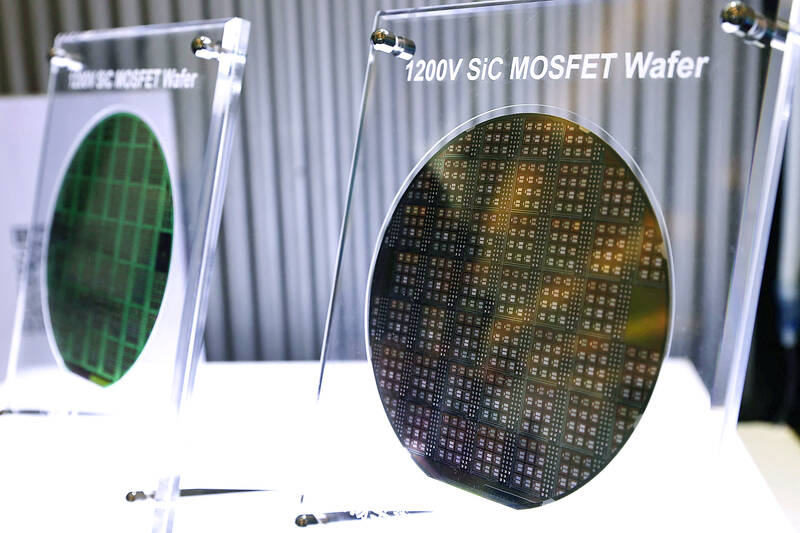Taiwan Semiconductor Manufacturing Co (TSMC, 台積電) is expected to drive growth in the global pure-play wafer foundry industry next year, Taipei-based market information advisory firm TrendForce Corp (集邦科技) said on Thursday.
The chipmaker is expected to benefit from its efforts to develop an advanced 3-nanometer process, on which it is scheduled to start mass production later this year, TrendForce senior semiconductor analyst Joanne Chiao (喬安) said at a technology forum in Taipei, adding that chips made using the process should command a higher profit margin.
Although the global pure-play wafer foundry industry has been undertaking inventory adjustments due to weakening demand, TSMC is expected to weather headwinds on the back of an increase in product prices, with the 3-nanometer process expected to make a significant contribution to its sales next year, when the firm is estimated to see its revenue rise 7 to 9 percent from this year, Chiao said.

Photo: Ann Wang, Reuters
A trial run of the 3-nanometer process began last year, while its 5-nanometer process is the latest technology for which it has launched mass production. Chips made using the technology accounted for 21 percent of TSMC’s total sales in the second quarter of this year.
An upgrade of the trialed process, dubbed 3-nanometer enhanced, is expected to first be used for commercial production next year.
On the back of TSMC’s growth, the global wafer foundry industry is expected to grow about 2.7 percent next year, moderating from an expected 28 percent increase this year, TrendForce said.
The global wafer foundry industry has been at a cyclical peak since 2020, when sales grew 24 percent from a year earlier, and year-on-year growth even hit 26.1 percent last year, Chiao said.
Demand weakness in the global wafer foundry sector has been a result of rapid inflation worldwide and China’s “zero COVID-19” policy, while US sanctions on the exportation of IC and related production equipment to China are expected to have an adverse effect on the global semiconductor industry, she said.
Although many countries are pushing for projects to build their own fabs, Taiwan’s lead over its peers in sophisticated process development should ensure its dominance in the global market for the foreseeable future, Chiao said.
However, as an increasing number of fabs are expected to start producing chips, an increase in supply is expected to present semiconductor producers with new challenges, she added.
Meanwhile, TrendForce Center for Research Operations chief operating officer Locke Chang (張小彪) said he remains cautious about the business outlook for global chip manufacturing next year.
There is no sign that inflation in the US and Europe can be brought under control in the near future, and China’s economy has been slowing amid its strict COVID-19 restrictions, which have created uncertainties in the global economy, Chang said.

TAKING STOCK: A Taiwanese cookware firm in Vietnam urged customers to assess inventory or place orders early so shipments can reach the US while tariffs are paused Taiwanese businesses in Vietnam are exploring alternatives after the White House imposed a 46 percent import duty on Vietnamese goods, following US President Donald Trump’s announcement of “reciprocal” tariffs on the US’ trading partners. Lo Shih-liang (羅世良), chairman of Brico Industry Co (裕茂工業), a Taiwanese company that manufactures cast iron cookware and stove components in Vietnam, said that more than 40 percent of his business was tied to the US market, describing the constant US policy shifts as an emotional roller coaster. “I work during the day and stay up all night watching the news. I’ve been following US news until 3am

Six years ago, LVMH’s billionaire CEO Bernard Arnault and US President Donald Trump cut the blue ribbon on a factory in rural Texas that would make designer handbags for Louis Vuitton, one of the world’s best-known luxury brands. However, since the high-profile opening, the factory has faced a host of problems limiting production, 11 former Louis Vuitton employees said. The site has consistently ranked among the worst-performing for Louis Vuitton globally, “significantly” underperforming other facilities, said three former Louis Vuitton workers and a senior industry source, who cited internal rankings shared with staff. The plant’s problems — which have not

UNCERTAINTY: Innolux activated a stringent supply chain management mechanism, as it did during the COVID-19 pandemic, to ensure optimal inventory levels for customers Flat-panel display makers AUO Corp (友達) and Innolux Corp (群創) yesterday said that about 12 to 20 percent of their display business is at risk of potential US tariffs and that they would relocate production or shipment destinations to mitigate the levies’ effects. US tariffs would have a direct impact of US$200 million on AUO’s revenue, company chairman Paul Peng (彭雙浪) told reporters on the sidelines of the Touch Taiwan trade show in Taipei yesterday. That would make up about 12 percent of the company’s overall revenue. To cope with the tariff uncertainty, AUO plans to allocate its production to manufacturing facilities in

TARIFF CONCERNS: The chipmaker cited global uncertainty from US tariffs and a weakening economic outlook, but said its Singapore expansion remains on track Vanguard International Semiconductor Corp (世界先進), a foundry service provider specializing in producing power management and display driver chips, yesterday withdrew its full-year revenue projection of moderate growth for this year, as escalating US tariff tensions raised uncertainty and concern about a potential economic recession. The Hsinchu-based chipmaker in February said revenues this year would grow mildly from last year based on improving supply chain inventory levels and market demand. At the time, it also anticipated gradual quarter revenue growth. However, the US’ sweeping tariff policy has upended the industry’s supply chains and weakened economic prospects for the world economy, it said. “Now